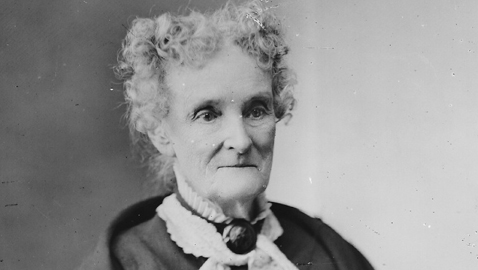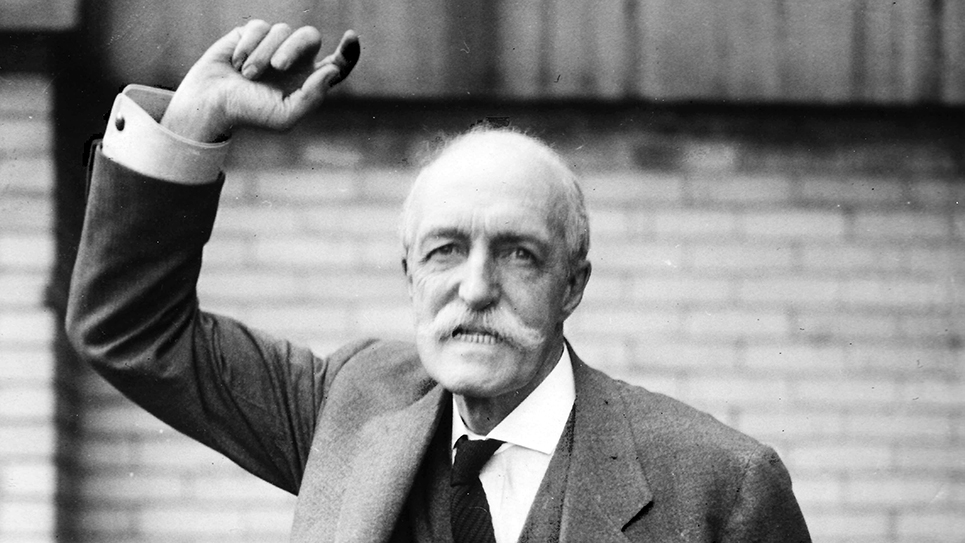Margaret “Peggy” Timberlake Eaton has been the subject of books and even one Hollywood film (The Gorgeous Hussy) and is oftentimes portrayed as the vixen who nearly caused the collapse of President Andrew Jackson’s administration. The controversy over Peggy Eaton certainly did cause Jackson’s Cabinet to collapse. At the heart of the matter were two things: presidential politics and social convention.
Born Margaret O’Neale, Peggy had enjoyed quite a few advantages in life as the daughter of a prosperous hostelry owner, William O’Neale. Mr. O’Neale was the proprietor of Franklin House in Washington, D. C. at a time when it was unheard of for Members of Congress to actually own a home in the vicinity. Most Congressmen and senators stayed in upscale boarding houses like Franklin House.
The lively Peggy was a supposed beauty and played the piano, but like many another young woman, she married early and perhaps unwisely. Considering that Peggy tended the bar at her father’s boarding house and possessed an irrepressibly flirtatious nature, she had little difficulty attracting men. After having tried to run off with two previous suitors, seventeen-year-old Peggy married John Timberlake, an impecunious thirty-nine year old purser employed by the U. S. Navy. The Timberlake union produced three children, although one did not survive infancy.
The plight of the Timberlakes moved young Tennessee United States Senator John H. Eaton to introduce a bill in Congress that would have provided enough money to pay off the debts accumulated by John Timberlake during his Navy service. Not surprisingly, the great majority of the Congress was not that sympathetic to the suffering of the Timberlakes. John Timberlake later conveniently expired while on an extended tour of duty on the USS Constitution. Later there would be dark rumors that Timberlake committed suicide after discovering his young wife was having an affair with Senator Eaton.
As it turned out, Peggy was quite socially ambitious and with her husband away at sea much of the time, there was ugly speculation as to the true father of her children and the relationship with Senator Eaton caused many to believe she was his mistress, a completely unacceptable situation in polite Washington society at the time. Eight months after her husband’s death, Peggy Timberlake married Senator John H. Eaton.
That was a scandalously short time for a widow to grieve in those days, much less fall in love and remarry. It caused many to believe the rumors about Mr. and Mrs. Eaton were all too true.
John Eaton was the political child of the most powerful and prominent politician in the country, General Andrew Jackson of Tennessee. Jackson had won the popular vote for the presidency in 1824, only to lose the election to Secretary of State John Quincy Adams when the election was decided in the U. S. House of Representatives. “Old Hickory” howled about a “corrupt bargain” when President-Elect Adams promptly named Speaker of the House Henry Clay, himself a presidential contender in the recent election, Secretary of State. General Jackson and his numerous supporters never let up in the following four years and few politicians before or since could hold a grudge like Jackson. General Jackson easily defeated President Adams in 1828, the first true “man of the people” to serve as President of the United States. Jackson’s victory was considerably less sweet as it had been a bitter campaign and the General’s beloved wife Rachel had been terribly upset by newspaper accounts, which had characterized her as a fallen woman and a bigamist. Kindly and quite religious, Mrs. Jackson was mortally wounded by the rumors swirling about her from the presidential campaign. Rachel Jackson died before her husband was sworn into office and the old General assumed the presidency as a bereaved widower.
President Jackson’s attitude was almost certainly colored by the loss of his wife and he ignored the whispers about Peggy and named his protégé John Eaton as Secretary of War. That caused immediate conflict with the members of Jackson’s Cabinet as most of the wives of the other Cabinet members absolutely refused to have anything to do with Peggy Eaton socially. The ensuing battle had as much to do with presidential politics as it did polite society. Vice President John C. Calhoun of South Carolina and Secretary of State Martin Van Buren of New York both desperately wished to be President of the United States after Andrew Jackson had served his time in office. General Jackson was also clearly the most popular political figure in the entire country at the time and being designated the old man’s successor would likely have considerable impact upon the nomination and election to succeed him.
Calhoun, self-righteous, stern and marble-faced, was a highly intellectual man, but not the able politician the vivacious Martin Van Buren was; in fact Van Buren had headed the powerful New York political machine and was so adept at the art of politics, he earned the nickname “the Little Magician”. By the end of the Eaton affair, Van Buren had indeed demonstrated his ability for intrigue and he had succeeded in eliminating his opponents and earned the right to succeed President Andrew Jackson.
At the inauguration, not a single Cabinet wife would speak to Peggy Eaton. The attitude of the Cabinet wives had been largely set by the example of Vice President John C. Calhoun’s wife, Floride. Mrs. Calhoun forced herself to endure social calls made on her by Peggy Eaton, but she steadfastly refused to return any calls. The other Cabinet wives quickly adopted the same attitude.
President Jackson became so concerned about the matter, he called a special meeting of his Cabinet to defend Peggy Eaton (who now preferred the more majestic “Margaret”). Remarkably, Jackson supposedly made the comment that Peggy was “as chaste as a virgin!”, quite an accomplishment for a woman who had borne three children and had been married twice. Several members of the Cabinet attempted to disabuse the old General’s notion of Peggy Eaton, but he would have none of it. When Andrew Jackson had made up his mind, it was virtually impossible to change it. Jackson finally compared Peggy Eaton’s case to that of his late wife and everyone knew Rachel had died due to the lies and slanders heaped upon her during the presidential election. It was dangerous ground they were treading upon at that point.
Still, the old General could not maintain discipline in his own household. His nephew, Andrew Jackson Donelson, was also his secretary. Much to his surprise, dismay and displeasure, Mr. and Mrs. Donelson strongly disapproved of Peggy Eaton. Jackson’s comment about Peggy being as chaste as a virgin caused Henry Clay to quip, “Age cannot wither her nor custom stale her infinite virginity.”
Only two members of the Jackson Cabinet would give Peggy Eaton the time of day; Secretary of State Martin Van Buren was the most conspicuous in his continued attentions to John and Peggy Eaton. Van Buren was ostentatious in helping Peggy in and out of her carriage and the Secretary of State was a frequent visitor to the Eaton home. Postmaster General William Barry, grateful to Peggy for having selflessly nursed his gravely ill child, stood publicly with the Eatons. The remainder of Jackson’s Cabinet refused to have anything to do with Peggy Eaton and the issue actually began to interfere with the operation of the government.
Martin Van Buren then conceived a plan, which would eliminate most of his political opposition inside the Jackson administration. He tendered his resignation as Secretary of State to President Jackson in April of 1831. John Eaton followed suit, by resigning as Secretary of War, giving Jackson the opportunity to demand that every member of his Cabinet resign. The rest of the Cabinet was shocked, but Jackson was insistent and he replaced them all. President Jackson then nominated Martin Van Buren to serve as Minister to the Court of St. James. Van Buren was already on his way to Great Britain when his nomination was rejected by the United States Senate. Vice President John C. Calhoun, who had worked hard to kill Van Buren’s nomination, chortled that the rejection would “Kill him dead, sir. Kill him dead”. Actually it accomplished quite the contrary. Andrew Jackson was enraged by the Senate’s failure to approve Van Buren’s nomination and selected him to serve as his running mate when he sought reelection later that same year. Martin Van Buren was elected Vice President of the United States on the Jackson ticket a few months later and succeeded the old General in the White House.
John Eaton’s political career was ruined by his marriage to Peggy. He tried to regain a seat in the United States Senate from Tennessee in 1834, but lost. Andrew Jackson appointed him that year as governor of Florida instead. Jackson later appointed Eaton as Minister to Spain in 1836. When the Democrats lost power in 1840, John and Peggy Eaton returned to Washington, D. C. where they were once again barely acknowledged by Washington society.
The irrepressible Peggy again raised eyebrows when she, then age fifty-nine, married the nineteen year old dancing instructor of her grandchildren. To say the marriage was an unsuccessful union would be gross understatement, as her young husband disappeared with all her money and her granddaughter. The faithless husband never married Peggy’s granddaughter Emily, although he had two children with her.
Peggy Eaton lived out her last years in the home of her grandson, impoverished, but still spirited when she died in 1879. The “Petticoat Affair” had determined a President of the United States.






